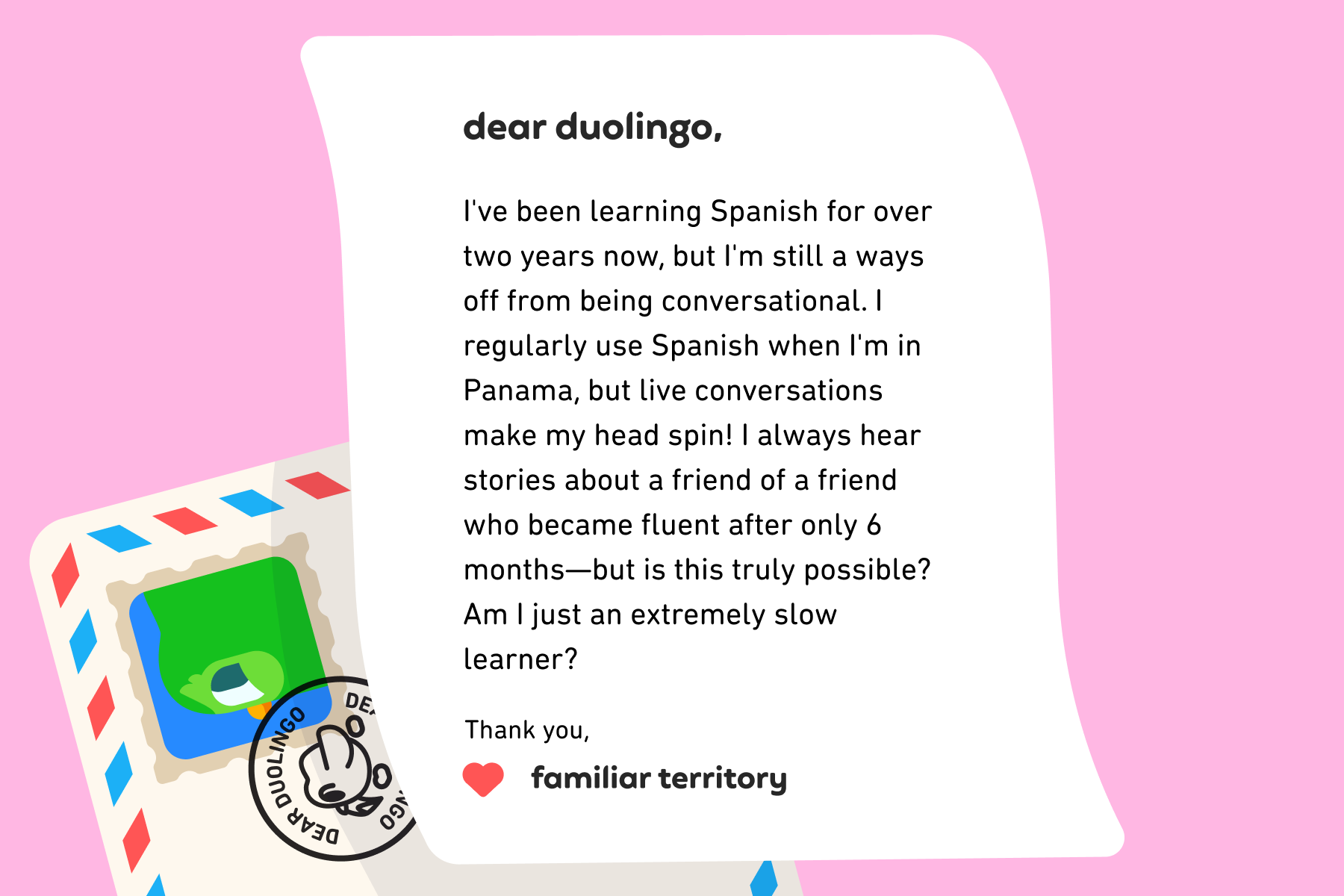Welcome to another week of Dear Duolingo, an advice column just for learners. Catch up on past installments here.
Hi, everyone! You might be familiar with some of the myths about language learning, and this week a learner asked about a classic misconception. There's a simple answer to the question—but the full explanation is what's interesting. Here it is:
This week's question:

I've heard this too (and have seen the ads, and watched the videos), and you'll be relieved to know the simple answer:
I could end the post there—but of course, *why* it's not possible is pretty interesting, and there are also plenty of strategies you can use to help yourself achieve your goals faster. But at the end of the day, it's going to take a lot of time, no matter what!
Can you learn a language in 6 months?
Say it with me: No.
*Why* can't you learn a language in 6 months?
Now that we've all shared a collective sigh of relief: Why isn't it possible?
Part of the reason is semantics. People mean different things when they say "fluent" or that they "know" a language. I always say I *know* 2 languages, but I can have conversations in many others… because is having a conversation the same as "knowing" a language? For example, I had many conversations in Italian while in Italy, and people understood me and I mostly understood them—but I can't read Italian books, understand Italian news programs, or do my job in Italian. So do I really know Italian? 🤷♀️ I would say no. It's semantics!
There is also just too much to learn in a few months—if what you mean is reaching high proficiency. If you break language down into vocabulary, grammar, pronunciation, and then into speaking, reading, writing, and listening, you can imagine an enormous matrix of all the stuff you have to learn. (You can get a sense of this by clicking into the sections of Duolingo's French and Spanish courses—they have to cover so much!) To work through all the proficiency levels requires years of sustained practice—no matter the language and no matter the learning method.
What people often mean by "fluent in 6 months" is being confident and conversational. And actually, that is possible!
How do some people learn so much, so fast?
Some people do make incredible progress in a short period of time. Here are some reasons why:
They have a lot of experience studying languages.
Once you've studied a second language, learning a third or fourth can be even easier! Not just for noticing patterns and knowing what to expect, but also for developing strong language learning skills.
They are super committed.
Many of these learners have a specific, personal motivation: to talk with their host family, to make friends on the soccer team, there's someone they want to impress. 👀
They are exceptional language learners.
Yes, it's true that some people are exceptional, but not many! Most people are just regular learners—that's why the exceptional ones are the exception.
How can I speed up my own learning?
Most people who *look* like great language learners are just really good at putting their language into practice. We don't typically see what the good language learners are doing during those first weeks and months, so it can be deceptive to hear about them much later.
How do they do it?
They speak from day one. In order to get to a conversational level, you'll need to use the language right away, from the very first day you start learning, when you hardly know anything! Just getting comfortable using a very limited vocabulary and a handful of grammar rules is a skill in itself—but it's absolutely worth the discomfort to start making real progress. Don't wait until you "know enough"... otherwise, you'll never feel ready!
They excel at making mistakes.
You read that right—these learners are so good at making mistakes. Mistakes are totally natural, even necessary for progressing in your language. What's more important than 100% accuracy is being able to use what you know and to describe things you don't know—that will help you work through doubts, get better at forming sentences, remember vocabulary more easily, and get more input from native speakers.
They immerse themselves.
No matter where you are, find ways to surround yourself with the language—and test out using only the new language. The people who learned the most on my study abroad trips abandoned the group, made local friends, and never looked back. (Note: This was not me! Do as I say and not as I did… 🫣) From your own home, sing along to music in the new language, watch your favorite show with dubbing and subtitles, or write mini dialogues only using words you know. Start small—read or write for 2 full minutes in the new language, then 5 minutes, and so on. Talk to a friend, to your dog, or to the mirror, using only the new language. See how long you can go!
They put in the time.
One lesson a day will keep your streak alive, but you'll need a lot more than that to make real progress. Use the sections and levels in the Duolingo courses to make a study plan for yourself, and dedicate time for focusing on the language. For example, when I had only 4 weeks to study German, I did Duolingo lessons for 30-60 minutes a day, plus a lot of talking to myself.
Jump into your new language!
The lesson we can learn from the fast learners—and the rumors about them—is to start using the language as much as possible, as soon as possible!
For more answers to your language and learning questions, get in touch with us by emailing dearduolingo@duolingo.com.



